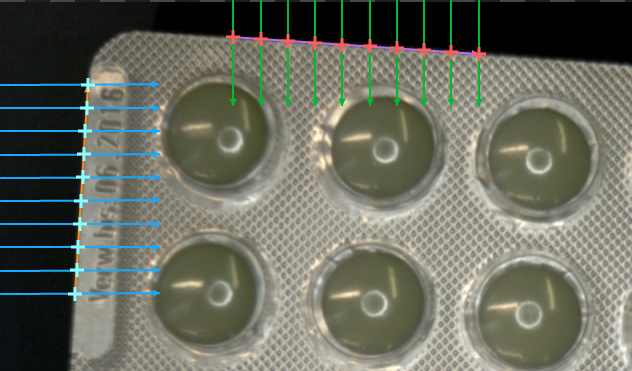You are here: Start » Function Reference » Computer Vision » Shape Fitting » FitSegmentToEdges
FitSegmentToEdges
| Header: | AVL.h |
|---|---|
| Namespace: | avl |
| Module: | MetrologyPro |
Performs a series of 1D edge detections and finds a segment that best matches the detected points.
Applications: Precise detection of a straight edge, whose rough location is known beforehand.
Syntax
void avl::FitSegmentToEdges ( const avl::Image& inImage, const avl::SegmentFittingMap& inFittingMap, const EdgeScanParams& inEdgeScanParams, avl::Selection::Type inEdgeSelection, atl::Optional<const avl::LocalBlindness&> inLocalBlindness, float inMaxIncompleteness, atl::Optional<avl::LineMEstimator::Type> inOutlierSuppression, atl::Conditional<avl::Segment2D>& outSegment, atl::Optional<atl::Array<atl::Conditional<avl::Edge1D>>&> outEdges = atl::NIL, atl::Optional<atl::Conditional<avl::Profile>&> outDeviationProfile = atl::NIL, atl::Optional<atl::Array<avl::Point2D>&> outInliers = atl::NIL, atl::Array<avl::Profile>& diagBrightnessProfiles, atl::Array<avl::Profile>& diagResponseProfiles )
Parameters
| Name | Type | Range | Default | Description | |
|---|---|---|---|---|---|
 |
inImage | const Image& | Image to fit segment to | ||
 |
inFittingMap | const SegmentFittingMap& | Input fitting map | ||
 |
inEdgeScanParams | const EdgeScanParams& | Parameters controlling the edge extraction process | ||
 |
inEdgeSelection | Selection::Type | Selection::Best | Selection mode of edges | |
 |
inLocalBlindness | Optional<const LocalBlindness&> | NIL | Defines conditions in which weaker edges can be detected in the vicinity of stronger edges | |
 |
inMaxIncompleteness | float | 0.0 - 0.999 | 0.1f | Maximal fraction of edge points not found |
 |
inOutlierSuppression | Optional<LineMEstimator::Type> | NIL | Selects a method for ignoring incorrectly detected points | |
 |
outSegment | Conditional<Segment2D>& | Fitted segment or nothing if the fitting fails | ||
 |
outEdges | Optional<Array<Conditional<Edge1D>>&> | NIL | Found edges | |
 |
outDeviationProfile | Optional<Conditional<Profile>&> | NIL | Profile of distances between the actual segment points and the corresponding reference segment points | |
 |
outInliers | Optional<Array<Point2D>&> | NIL | Points matching the fitting segment | |
 |
diagBrightnessProfiles | Array<Profile>& | Extracted image profiles | ||
 |
diagResponseProfiles | Array<Profile>& | Profiles of the edge (derivative) operator response |
Optional Outputs
The computation of following outputs can be switched off by passing value atl::NIL to these parameters: outEdges, outDeviationProfile, outInliers.
Read more about Optional Outputs.
Description
The operation tries to fit a given segment to edges present in the inImage image. Internally, it performs a series of scans with the ScanSingleEdge filter using inFittingMap previously generated from the object being fitted. The found points are then used to determine the actual position of the segment in the image. Only inMaxIncompleteness fraction of these scans may fail. If the fitting according to the given parameters is not possible, outSegment is set to Nil.
Hints
- Connect an input image to the inImage input.
- Define inEdgeScanParams.EdgeTransition to detect a particular edge type, and only that type.
- If no or too few edge points are found, try decreasing inEdgeScanParams.MinMagnitude.
- If some of the scans may fail, set the inMaxIncompleteness input accordingly.
- If some of the scans may produce false results, try different values of the inOutlierSuppression input.
- Use the outEdges outputs to visualize the scanning results.
Examples

Fitting two segments to the edges of a blister
(inEdgeScanParams.EdgeTransition = DarkToBright, inEdgeScanParams.SmoothingStdDev = 1.0).
Remarks
Read more about Local Coordinate Systems in Machine Vision Guide: Local Coordinate Systems.
This filter is a part of the Shape Fitting toolset. To read more about this technique, one can refer to the Shape Fitting chapter of our Machine Vision Guide
Hardware Acceleration
This operation supports automatic parallelization for multicore and multiprocessor systems.
See Also
- CreateSegmentFittingMap – Precomputes a data object that is required for fast segment fitting on images.
- FitSegmentToRidges – Performs a series of 1D ridge detections and finds a segment that best matches the detected points.
- FitSegmentToStripe – Performs a series of 1D stripe detections and finds a segment that best matches the detected points.
- FitSegmentToEdges_Direct – Performs a series of 1D edge detections and finds a segment that best matches the detected points.

